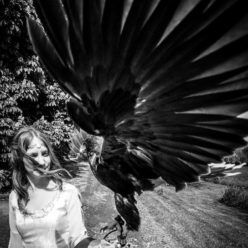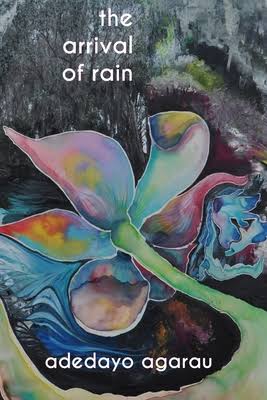The Arrival of Rain is more than a title for Adedayo Agarau’s collection but an incantation. Once spoken, and the reader begins these poems, a monsoon of imagery is released to overwhelm and drown; disorientate in the flood; sinking with the weight of language and visions until the reader gives in and floats, then splashes about in its colours.
Heritage is a recurring theme in the collection that informs the present and the future and cannot be escaped. In ‘the raging sea,’ the poet is a ‘song of shackles / a bloodline of shadow and myth’ and the poem ‘untitled’ develops this theme of family and what is passed down to us. Through many poems an ambivalent relationship is revealed with the father, a person who is both absent, whose loss is mourned, but is also resented. The father’s voice ‘bites;’ a father ‘raised his voice instead of raising his boys,’ but this same father was also dragged ‘like taboo before blowing his head against the sitting room wall.’ These poems on this subject seek to make sense of this loss; relationship and man, and what it means to the self.
Heritage leads to the body. Agarau works through what his heritage has done to him, how he has emerged as a child, a boy, a son. The body is a place of turbulence, of dis-ease with it as the poet juxtaposes intense sensuality and love with feelings of ambiguous shame, imagery of cleansing from the sea, all informed by the perhaps complex relationship with God which is portrayed throughout. Love and God are combined with bitterness and discomfort in ‘mannequin unburnt,’ and religious imagery of sacrifice, water, swine and searching for God are contrasted against the fallibility of faith in poems like ‘baptism.’ Ultimately, Agarau has to forge his own way through spirituality to find a comfortable place to unite his soul with his body.
And the body leads to country. Agarau pulls no punches when he shows you the history of his homeland, where bodies are just ‘scores’ in ‘what it means to be freed by your country.’ Brutality is heaped upon itself horrifyingly as he paints the stark picture of a land overrun, in conflict, enslaved and trying to find itself through violence. The poems ‘a small dialogue about running,’ ‘there are no graves for the dead,’ ‘what it means to be freed for your country,’ and ‘a cathedral of birds’ try to find ways of remaining whole against the backdrop of cutlasses, guns and machetes, ‘nests of bullets,’ and against murdered children, cousins and fathers.
Yet through all this, Agaurau creates something beautiful. His imagery is extraordinary; he reveals a mastery over language, or perhaps even a liberation from its constraints. In images from ‘first portrait of me as adedayo’ like, ‘my fingers are not flowers…not morning dew sitting at the tip of a tongue,’ and ‘a little flower/praying for the sun pleading to be left alone in the wind alone/with the stars in a night sky alone with the grief trapped/ in the ship of its own sea,’ the subject is introduced, then blooms and develops, losing you in a flurry of metaphor that is heaped one on top of the other. The reader is breathless to keep up with the journey forward to find the truth. The effect is hypnotic.
Agarau defies conventions with his structure and metaphor. Standard punctuation is rejected in favour of a few commas and the enigmatic forward slash; no capital letters are used. Sentences become like thoughts and images themselves, they flicker into the reader’s attention, then are overtaken by empty space created to give pause before a new image rises. At times these spaces and forward slashes create caesura-like effects, isolating and fragmenting ideas that reflect the feelings of fragmentation Agarau often grapples with. Poems like ‘second portrait as adedayo’ use this form exquisitely; ‘means my name is a ferry on a lake / means the body is a dead thing to me / means I am entering a city blessed with fury / means the dogs bark at me…’ to tumble out and line up feelings cut off and opposed to each other. Agarau’s use of structure and beautiful imagery embodies the pieces of a broken world which he strives to put back together; to fix a body searching for unity and connection to itself. All against haunting scenes of bodies that ‘will give up ghosts,’ to create something beautiful and powerful and living.
As ever, I may be way off the mark with author intentions, but this is what these poems meant to me. The Arrival Of Rain is published by Vegetarian Alcoholic Press and is available on Amazon and Booktopia.

